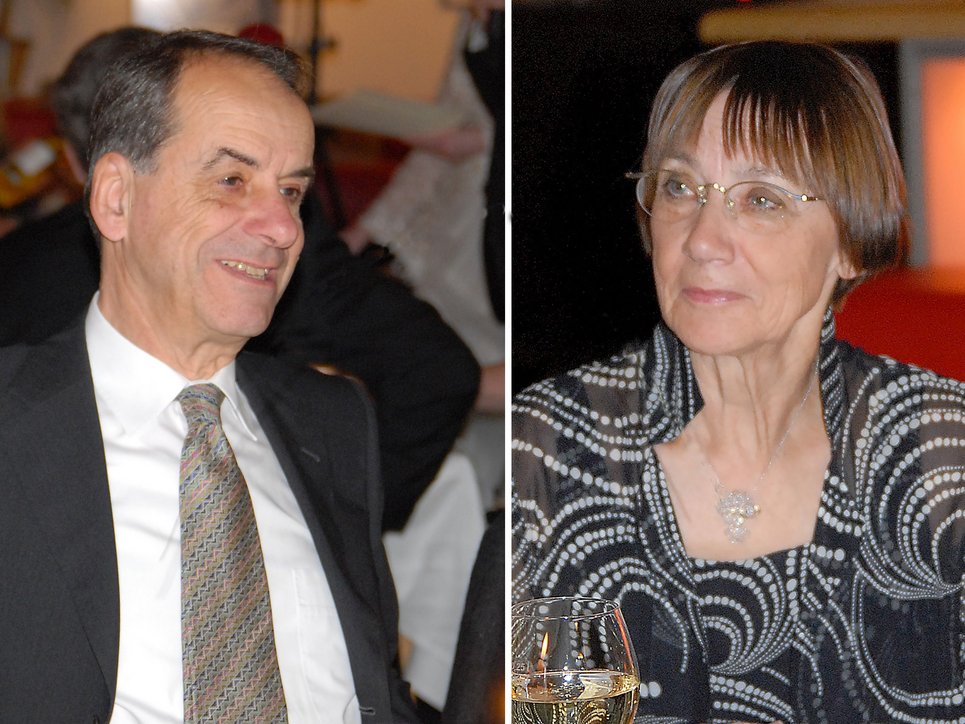Obituary for Susanne and Axel Flessner
Susanne Flessner † 18 November 2022, Axel Flessner † 26 November 2022

Susanne Flessner, born 18 December 1931, came from Bremen and developed an interest in Southeast European legal systems while studying law in Hamburg. She began her work as a research fellow at the Institute on 1 January 1961, where as a first task she supported Hans Dölle, then Director at the Institute, in the preparation and publication of the “Darstellung des deutschen Familienrechts mit rechtsvergleichenden Hinweisen” (1964/65); her contribution was not limited to an editorial role but also encompassed content. Axel Flessner, born on 22 December 1935, had studied law in his native city of Hamburg as well as in Freiburg, Munich, and New Orleans. He began working as a research fellow at the Max Planck Institute on 1 August 1961. His comparative law dissertation, supervised by Konrad Zweigert, was devoted to the law of unjust enrichment (published in 1970). Axel Flessner was active at the Institute not only academically but also in very tangible ways. His practical focus was demonstrated by his extensive involvement in the clarification of building issues related to the construction of the then side wing of the Hamburg Max Planck Institute.
Of particular note for present readers are the efforts of the Flessners on behalf of the Rabel Journal, where they at times shared individual editorial tasks. For more than a decade, from 1970 to 1980, the overall editorship of the journal was in the hands of Susanne Flessner. The Journal’s review section, which both surveys and critically discusses new academic literature, fell within the responsibility of Axel Flessner from 1972 to 1980.
After his habilitation at the University of Hamburg, Axel Flessner left the Institute in 1980 to take up a professorial post at the Goethe University in Frankfurt am Main. From 1994 until his retirement in 2000, he held the chair of German, European, and International Private Law and Comparative Law at the Humboldt University in Berlin.
As a university lecturer, Axel Flessner remained true to his previous fields of research, developing his scholarship further. It was characteristic of this work that he often focused equally on the conflict-of-laws, comparative law and uniform law aspects of his topics. In doing so, he not only examined the individual ways of dealing with cross-border legal relationships but studied also their relationship to each other in the context of European and international regulatory approaches.
Of his varied and numerous contributions, only a few can be mentioned here. He actively participated in the development of European private law but at the same time was a critical observer. This applies not only to the development of principles of European private law but also to individual issues such as identifying a European position on the law of damages and on (temporary) non-performance. Axel Flessner was also co-editor of the Zeitschrift für Europäisches Privatrecht (ZEuP) from its inception in 1993.
One particular focus of his academic work was insolvency law. His post-doctoral thesis, which like his doctoral dissertation was printed in the Institute publication series, was devoted primarily to the reorganization and restructuring of large companies (1982). The work deals with the preparation and implementation of a reorganization plan in the context of the “breathing space” that is afforded to a company in the context of the reorganization process. Later, Axel Flessner participated in the development of European insolvency law. He gave, for example, the introductory address at the 2005 annual meeting of the Alumni Association of the Max Planck Institute in Hamburg, a gathering which was devoted to European and international insolvency law.
Axel Flessner was always concerned with methodology in the study of private international law. This was especially true for the development of a “realistic” jurisprudence of interests, one that should better deal with the true party interests (1990). Many individual topics met with his curiosity, such as party autonomy in international property law, the role of the lex fori, and the international assignment of claims. His advocacy of an optional conflict of laws (fakultatives Kollisionsrecht) (1970) proved, however, unsuccessful.
The Europeanization of legal education was also an important topic for Axel Flessner. He was one of the spokespersons for the post-graduate program titled “European Private and Commercial Law” at Humboldt University, which existed from 1996 to 2004.
Axel Flessner saw diversity and multilingualism as being indispensable building blocks also for the creation of a European private law culture. At the same time, he warned against complacency in view of the ever increasing advance of English. Thus, a proper regard for German as the language of both scholarship and judicial proceedings was a further concern for which he actively campaigned. Legal methodology and European private law were the topics of his farewell lecture on 9 July 2001. In the development of innovative and uniform solutions, the comparative view was always an important starting point for him.
Prior to his passing, Axel Flessner was able to complete his long-planned “European Contract Law” (which was originally intended to be part of a broader work written together with Hein Kötz). During his regular visits to the Institute’s library, he worked to the last on the volume, which will now be published posthumously.
In the recent past, Axel Flessner focused on the challenges posed by international investment protection and investment arbitration. On multiple occasions he addressed the problems posed by bilateral free trade agreements entered into by the European Union. With reference to German constitutional law and Union law, he saw such agreements as an unjustified source of both “self-empowerment and self-disempowerment”, thus constituting a threat not only to sovereignty but also to the principle of democracy.
On 31 July 1980, Susanne Flessner left the Max Planck Institute in Hamburg, at almost the same time as her husband, and assumed from 1982 to 2009 the editorship of the journal “Das Standesamt” (StAZ), a publication of the Verlag für Standesamtswesen in Frankfurt. Though the trademark of the journal has always been the topic of civil status, relating not only to issues of practical relevance but also to a deeper academic analysis of conflicts regarding domestic and international family law and procedural law, her focus of inquiry went further still. Especially for the numerous domestic and foreign reform projects, the StAZ is an important forum for the dissemination of information and discussion, and Susanne Flessner travelled to many conferences and maintained contact with numerous authors and, significantly, with associations of registrars – especially in Germany, Austria, and Switzerland.
In addition to serving as the StAZ’s managing editor, Susanne Flessner took on further legal editing tasks with the publishing house and was particularly involved with the Bergmann/Ferid/Henrich collection on international marriage and child law. This unique loose-leaf collection, totalling 25 folders, provides reliable and up-to-date information, with the online version including over 150 country reports. In addition to nationality law, which is relevant for determining the applicable law, the uniformly designed country reports cover the areas of marriage law, child law, the law of names, private international law, and international civil procedure. The structure developed by Susanne Flessner has given the collection a uniform face, helping it to accommodate the numerous changes that have been witnessed over the past decades in terms of substantive law and the conflict of laws. Many of the contributors are also current and former employees of the Max Planck Institute in Hamburg, which meant that Susanne Flessner remained connected to the Institute also in these activities.
Axel and Susanne Flessner were held in extremely high esteem by their academic colleagues in Hamburg and elsewhere. The same can be said in relation to Axel Flessner’s activities as a university instructor. His in-depth scholarly analyses led him to repeatedly advance independent positions. Through her work as editor and editor-in-chief, Susanne Flessner often created the basis for discourse in the complex European legal arena. Their deaths represent the loss of two far-sighted scholars who were extraordinarily productive and committed to academia. They are survived by their daughters Melanie and Camilla.
Dieter Martiny
The obituary will be published in German in issue 1/2023 of the Rabels Zeitschrift für ausländisches und internationales Privatrecht (RabelsZ).
